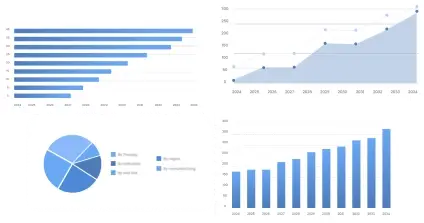
By clicking “Accept All Cookies” you agree to the storing of cookies on your device to enhance site navigation, analyze site usage, and assist in our marketing efforts.
Privacy Policy

Germany's biotech strength boosts plasmid DNA production for gene therapy, vaccines, and mRNA tech, driving CDMO growth and global supply chain role.
Germany's robust biotechnology industry, sophisticated research facilities, and supportive regulatory environment are helping it to become a major centre in the plasmid DNA production industry. The country's leadership in gene therapy and mRNA technology has created a solid foundation for the expansion of plasmid DNA uses. Plasmid DNA is becoming more and more widely used in Germany for preclinical and clinical studies in gene therapies, DNA vaccines, and developing fields like mRNA therapeutics and synthetic biology. To satisfy the growing need for high-quality GMP-grade plasmid DNA, German biopharma firms and CDMOs are developing their capacities. Infrastructure improvements and new facility development spurred by public and commercial investments are helping Germany to be a strategically important contributor to the European and worldwide plasmid DNA supply chain.
Published by Ajit Bansod
| Subsegment | 2024 | 2025 | 2026 | 2027 | 2028 | 2029 | 2030 | 2031 | 2032 | 2033 | 2034 |
|---|---|---|---|---|---|---|---|---|---|---|---|
| Viral Vectors | - | - | - | - | - | - | - | - | - | - | - |
| Plasmid DNA | - | - | - | - | - | - | - | - | - | - | - |
| Non-Viral | - | - | - | - | - | - | - | - | - | - | - |
| Electroporation | - | - | - | - | - | - | - | - | - | - | - |
| Lipid/Polymer | - | - | - | - | - | - | - | - | - | - | - |
| Nanoparticles | - | - | - | - | - | - | - | - | - | - | - |
| Others | - | - | - | - | - | - | - | - | - | - | - |
| Subsegment | 2024 | 2025 | 2026 | 2027 | 2028 | 2029 | 2030 | 2031 | 2032 | 2033 | 2034 |
|---|---|---|---|---|---|---|---|---|---|---|---|
| Gene Therapy | - | - | - | - | - | - | - | - | - | - | - |
| DNA Vaccines | - | - | - | - | - | - | - | - | - | - | - |
| Immunotherapy | - | - | - | - | - | - | - | - | - | - | - |
| Others | - | - | - | - | - | - | - | - | - | - | - |
| Subsegment | 2024 | 2025 | 2026 | 2027 | 2028 | 2029 | 2030 | 2031 | 2032 | 2033 | 2034 |
|---|---|---|---|---|---|---|---|---|---|---|---|
| Infectious Disease | - | - | - | - | - | - | - | - | - | - | - |
| Genetic Disorder | - | - | - | - | - | - | - | - | - | - | - |
| Cancer | - | - | - | - | - | - | - | - | - | - | - |
To get full access to our Market Insights, you need a Professional Account or a Business Suite.

You will receive an email from our Business Development Manager. Please be sure to check your SPAM/JUNK folder too.

You will receive an email from our Business Development Manager. Please be sure to check your SPAM/JUNK folder too.

Our customers work more efficiently and benefit from


